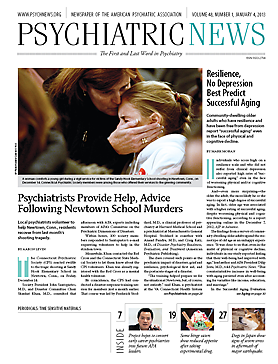The United States isn’t the only nation concerned about the mental health of soldiers once they return home from dangerous duty abroad.
Norway has deployed its soldiers on peacekeeping missions to the former Yugoslavia and Lebanon. More than 10,000 Norwegian troops have served in Afghanistan as well.
The Norwegian approach to military psychiatry grew out of decades of experience after those military involvements, explained Maj. Øyvind Erik Jensen, M.D., in an interview with Psychiatric News.
“Psychiatrists help train the troops before they go, but we do not deploy with them,” because the units are too small to warrant a full-time clinician, said Jensen. Overall responsibility for soldiers’ welfare always lies with their commanding officers. “We are just their advisors.”
However, two psychiatrists or psychologists are on duty 24 hours a day in Norway during deployment of its troops and can fly out to the unit if some major traumatic event, like a roadside bomb blast with casualties, occurs.
Jensen did serve two six-month tours of duty in Kosovo and Afghanistan but as a general medical officer, not a psychiatrist.
One major difference between U.S. and Norwegian soldiers is that Americans spend a year in battle zones while the Norwegians serve only six months away. (U.S. Marines serve shorter deployments.) The Norwegians also get two two-week home leaves during that time.
“We are only borrowing the soldier from their families, from their social networks, and from their communities,” said Jensen. “They will spend most of their lives outside the armed forces, so it’s best that they remain rooted in civilian society.”
When troops return from deployment, they don’t go straight back to Norway. The unit makes a stopover on the way—usually in Denmark or Sweden—for a few days to unwind and go through a tactical military debriefing.
Jensen and other clinicians also talk individually with each returning soldier.
“We get them out of the activation phase, out of the war zone,” he said. “I tell them: Today you’re in Sweden and tomorrow you’ll be in Norway, but your hormones will still be in Afghanistan for another fortnight.”
Soldiers seem to prefer biological explanations for what they are experiencing. “Cortisol” works better as an explanation than “feelings” or “anxiety,” he said. “We hope that this will reduce the risk of PTSD in the future.”
In addition, like the British Army and others, the Norwegians schedule their troops to remain at home for longer stretches than those for which they are deployed. Norway uses a 4-to-1 ratio; after six-months away, a soldier should remain at home for two years.
Jensen realized the value of this rule of thumb after talking with one officer who went through seven six-month tours of duty in the Balkans in seven years and developed severe posttraumatic stress disorder.
Once their military careers are over, Norwegian troops often face barriers to specialized care because Norway does not have the equivalent of a VA health system, said Jensen. Part of that problem arose with the shift from a draft to a volunteer, professional army.
“In the past, the army was seen as part of the nation, so it was assumed that the general health service should care for soldiers after they left the army,” he said.
However, too few civilian clinicians understood about the stressors faced by military personnel, although there are increased training opportunities now, he said.
In the absence of a veterans health care system, Norway’s military health service will care for veterans for 14 months after their enlistments end.
“Now, any veteran with any mental health issue can be evaluated by a military psychiatrist and get short-term therapy,” he pointed out.
“If they need more treatment, we arrange it with a psychiatric outpatient clinic in the civilian health system,” said Jensen. “We want to give our soldiers good care while they’re serving and good follow-up for the rest of their lives.” ■

